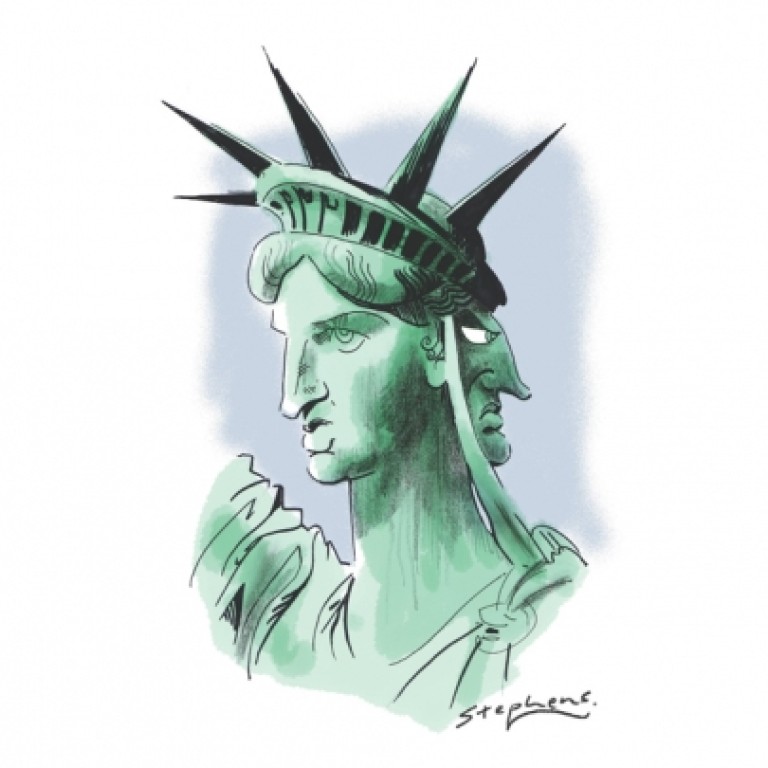
The US security state laid bare
Philip Cunningham says the exposure of the dark undercurrents of the American security state has fuelled outrage at its double standards, but will it force a needed change of course?
Sales of George Orwell's works are said to be enjoying a small boom ever since the National Security Agency spy story broke, suggesting that, in confusing times, people still find solace in aphorisms and essays, fiction and fantasy, seeking to get a better grip on the uncharted and unclear dangers of the present.
America is going through a rough patch, engaged in a contentious national debate about how best to balance freedom with security, and how to handle secrecy with accountability. It's a time of excess, a time in which the word "traitor" will be brandished at those who dare to blow the whistle on wrongdoings or challenge the sacred cows of a smug, elitist security state.
The current era of governmental overreach, fired up by false notions of patriotism, may, in retrospect, be regarded as an aberration akin to that of the fear-mongering McCarthyism that dimmed the lights in the land illuminated by the torch of Miss Liberty. It, too, will pass.
China has known rough times, times far rougher than anything the relatively privileged young nation of America has had to face, but in recent years, the tide has begun to turn. The two nations are closer to parity than ever before, not just because America is at war and in decline, but because China is at peace and on the rise.
America may be the wealthiest nation in the world, but most of the wealth is greedily held in the hands of a few, while public expenditure is mostly funded by the taxes paid by people of lower and middle income. The US administration cries poverty when it comes to fixing America's 18,000 broken bridges and pot-holed highways, but it extorts from the taxpayer funds for a bottomless purse when it comes to blowing up bridges and replacing them in places like Afghanistan and Iraq.
It's a time of high-dudgeon hypocrisy, when the world's most formidable hacking state, bar none, chides others for doing what it does on a larger scale; when the world's most aggressive interventionist regime with an awesome network of military bases spanning the globe rains bombs on relatively defenceless countries, to exert its will and a warped vision of the American way.
What NSA whistle-blower Edward Snowden seems to be telling us is that the American security state is guilty of excess yet unable to correct itself. Policy has broken free of democratic safeguards and is racing out of control. The ship of state is listing dangerously and someone has to blow the whistle.
"In a time of universal deceit, telling the truth is a revolutionary act," is a quote oft attributed to Orwell, though, in a truly Orwellian twist, it is not exactly clear where it comes from. In any case, it fits Snowden aptly, for the only thing remotely revolutionary about him is his willingness to tell the truth.
Far from being a firebrand, he comes across as an ordinary, conservative, soft-spoken tech guy whose extraordinary access to the clandestine activities of the world's most powerful nation alerted him to dangers hidden from public view, dangers that threaten to destroy a much-beloved free way of life. He sees semi-submerged icebergs ahead but no one on the Titanic wants to believe him, least of all the captain and the crew.
It wasn't always this bad and there is still time to right the course, if Washington snaps out of its self-induced, self-perpetuating anti-terror trance, stops hiding behind an invisibility cloak of secrecy wrapped in excessive self-regard, and starts getting back to basics like science and democracy.
Look at the news in the past week. While the Obama administration was trying to justify its war on whistle-blowers, abuse of secrecy and expansive surveillance, China launched a brand new Shenzhou rocket sending three astronauts into space; the kind of thing the US did peerlessly in its prime, but seems incapable of doing nowadays. When Americans get blasted into space, it's as guests on Russia's Soyuz space capsule.
It's as if the US gave up on Nasa and replaced it with NSA, jettisoning the promotion of science and exploration of space in exchange for a turning inward into a dark and convoluted world of endless eavesdropping.
One of the small, ironic revelations that has come out of the NSA whistle-blower scandal is that a thoughtful and earnest high school dropout like Snowden has proved himself a better judge of basic American constitutional rights and common decency than a Harvard University-educated lawyer turned president. Barack Obama needs to drop the pretence that the US has the high moral ground in arguments about hacking, surveillance, government monitoring of citizens or even civil rights.
Any such pretensions have been obliterated by the dynamite revelations that the US is running the biggest spy operation in the history of the world without adequate safeguards, accountability, respect for privacy and civil rights.

